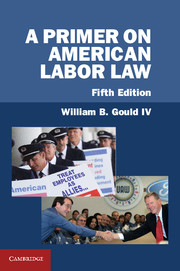Book contents
- Frontmatter
- Contents
- Preface to the Fifth Edition
- Preface to the Fourth Edition
- Preface to the Third Edition
- Preface to the Second Edition
- Preface to the First Edition
- 1 An Overview
- 2 Industrial Relations and Labor Law before Modern Legislation
- 3 The National Labor Relations Act and Related Labor Law
- 4 Unfair Labor Practices
- 5 Establishing the Collective Bargaining Relationship: Organization and Recognition
- 6 Economic Pressure and Bargaining Tactics in the Established Relationship
- 7 Remedies, the Labor Reform Bill of 1978, and the Employee Free Choice Bill of 2009
- 8 Dispute Resolution in the Established Relationship
- 9 The Duty of Fair Representation
- 10 The Public Sector
- 11 Public-Interest Labor Law
- 12 Conclusion
- Index
- References
Preface to the Fifth Edition
Published online by Cambridge University Press: 05 June 2013
- Frontmatter
- Contents
- Preface to the Fifth Edition
- Preface to the Fourth Edition
- Preface to the Third Edition
- Preface to the Second Edition
- Preface to the First Edition
- 1 An Overview
- 2 Industrial Relations and Labor Law before Modern Legislation
- 3 The National Labor Relations Act and Related Labor Law
- 4 Unfair Labor Practices
- 5 Establishing the Collective Bargaining Relationship: Organization and Recognition
- 6 Economic Pressure and Bargaining Tactics in the Established Relationship
- 7 Remedies, the Labor Reform Bill of 1978, and the Employee Free Choice Bill of 2009
- 8 Dispute Resolution in the Established Relationship
- 9 The Duty of Fair Representation
- 10 The Public Sector
- 11 Public-Interest Labor Law
- 12 Conclusion
- Index
- References
Summary
The pace of developments in the decade since the fourth edition was published in 2004 has been brisk. Perhaps in part because of the continued decline of the organized sector of the economy – organized labor shrank to 11 percent in 2012, constituting slightly less than 7 percent of the private sector – the focus on labor-law reform, which had been debated in the 1970s and 1990s, emerged anew between 2007 and 2009. This took the form of the Employee Free Choice Act, which President Barack Obama supported in the 2008 presidential campaign and again subsequent to his inauguration in 2009 – and it was unsuccessful primarily for the same reason that labor-law reform did not see the light of day in 1978, that is, the filibuster in the United States Senate, which requires a supermajority of sixty votes to obtain consideration on the merits. Disillusionment with the appointments of President George W. Bush accelerated demand for labor-law reform, producing a veritable boycott of the National Labor Relations Board akin to what had transpired in the presidency of Ronald Reagan in the 1980s, as well as greater reliance upon voluntary “card check” agreements between labor and management, which thus far appear to be atypical. The so-called September Massacre of 2007 of labor rights by the Bush Board was part of this piece. The failure of President Bush and the Democratic Senate to agree on new appointees between 2007 and 2009 led to what the Supreme Court characterized as the lack of a statutory quorum, invalidating all of its decisions from 2007 through 2009.
Meanwhile, the Obama Board ran into heavy weather with the Republicans in Congress who attacked NLRB rulemaking, some Board decisions, as well as the General Counsel’s issuance of a complaint against Boeing – and, in the process, the inability of the White House to obtain a consensus with the Republican Congress in 2011 produced a round of recess appointments early in 2012. In January 2013, a panel of the Court of Appeals for the District of Columbia held unanimously that President Obama’s 2012 recess appointments were unconstitutional under the Recess Clause of the U.S. Constitution, which threatened to put the Board out of business, as it had been earlier between 2007 and 2009.
- Type
- Chapter
- Information
- A Primer on American Labor Law , pp. ix - xivPublisher: Cambridge University PressPrint publication year: 2013



